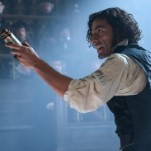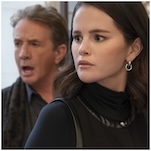The Best Baseball Movies of All Time
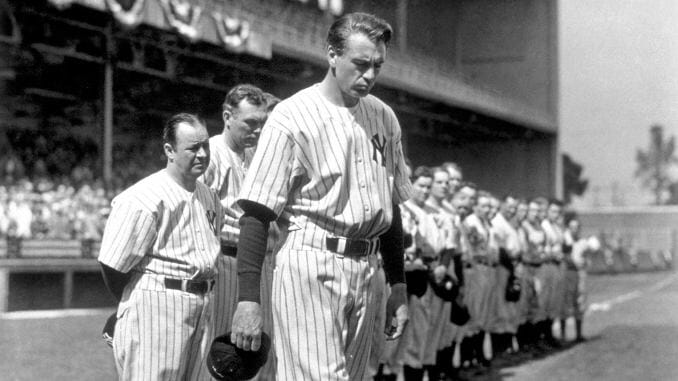
We first wrote this list when the surprise Oscar favorite Moneyball, which found gripping drama from the nuts and bolts of baseball stats (introducing many to the word “sabermetrics”), turned 10 years old. In celebration of its anniversary, we looked back beyond the modern era of sports cinema to get you into the baseball spirit with that other national pastime, The Baseball Movie. The first half of the 20th century was full of motion pictures with titles like The Pinch Hitter (1917), Life’s Greatest Game (1924) and The Bush Leaguer (1924). But it wasn’t until 1942 that Pride of the Yankees proved you could make a baseball movie and make a great film. Since Right Off the Bat in 1915, there have been some 200 baseball films produced. We contend, however, that the golden age of baseball movies was a nine-year stretch from 1984 to 1993, when fully half our picks were released. So pop some popcorn—or better yet, buy yourself some peanuts and cracker jacks—and settle in with one of the best baseball movies of all time.
Here are the best baseball movies of all time:
20. The Stratton Story (1949)
Director: Sam Wood
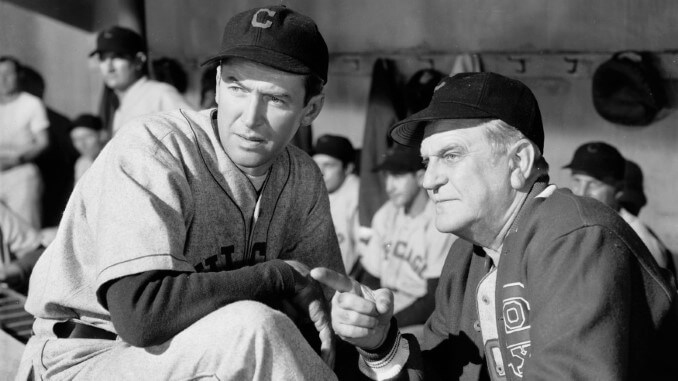
Consider The Stratton Story a victory lap from the filmmaker who brought us a top-tier baseball movie in The Pride of the Yankees. Following up his 1942 film about Lou Gehrig, director Sam Wood took on another weepy story about a ballplayer suffering a physical tragedy. Monty Stratton, a White Sox pitcher, was plucked from backwoods nowhere (naturally, Jimmy Stewart gives one of his patented aw-shucks performances with a side of the acid that made him such a nuanced star) only to find his success cut short by a hunting accident. June Allyson plays his girl-next-door wife with pluck and vigor, while the story travels through familiar ballparks and familiar beats. Its inspirational biopic tale won its story an Oscar, but its most winning moments take place on the mound and in pick-up games of catch. Stories of unlikely success can get old, but watching actors sling a baseball never does.—Jacob Oller
19. It Happens Every Spring (1949)
Director: Lloyd Bacon

Before the awesomely unfair advantage genre of baseball films was made popular by the likes of Rookie of the Year and Angels in the Outfield (both the 1951 original and the 1994 remake), there was this little comedy starring Ray Milland as a struggling professor who discovers a formula that repels wood. He needs a way to earn money so he can marry his sweetheart. So, what does he do next? What any normal person would: Become a major league pitcher. Rub some of that crazy repellent on the ball, and the only person laying a bat on your game is the bookie in the alley you forgot to pay off. —Joe Shearer
18. Rookie of the Year (1993)
Director: Daniel Stern

There are a glut of sappy, kid-friendly underdog stories about baseball, but Rookie of the Year rises just above its peers. As with It Happens Every Spring, there’s a nice fantasy element involving the lovable loser who catches a break. In this case, it’s a kid who breaks his arm. When the cast comes off, his tendons have tightened so that he can throw more than 100 mph. He becomes a pitcher for the Chicago Cubs, and while fame and fortune are great, there comes the time when the hero has to ask himself what’s more important, the good life or his friends? —Joe Shearer
17. Fever Pitch (2005)
Director: Bobby Farrelly, Peter Farrelly

Although his film career has more than its fair share of bad movies (Taxi, anyone?), Jimmy Fallon put together an oddly endearing performance in this underrated, underseen Farrelly Brothers flick. The premise makes you think it will simply be about Fallon’s character learning that “love is more important” than his diehard Boston Red Sox obsession, but it ends up having a slightly deeper perspective on issues of vulnerability and abandonment. Fallon is undeniably charming, both funny and sympathetic opposite Drew Barrymore’s character in a film that was very loosely adapted from a Nick Hornby memoir about his diehard love for Arsenal.—Jim Vorel
16. 42 (2013)
Director: Brian Helgeland

The entire life of Jackie Robinson is a rich subject for a film adaptation, not that this would be obvious after viewing 42, Brian Helgeland’s fourth feature film. But as a portrait of segregated, post-war America, 42 serves its purpose, and if viewed primarily as a baseball movie, Helgeland’s film becomes a wholly enjoyable and thrilling experience, perhaps even a triumph. 42 focuses on two legends in American baseball—Branch Rickey (played by an appropriately theatrical Harrison Ford), the executive of Major League Baseball who first integrated the sport, and Jackie Robinson (Chadwick Boseman) who became the first black to play in the majors when he signed to the Brooklyn Dodgers in 1947. The plot of 42 follows Robinson’s transition from the Negro Leagues to the Minor Leagues, and then to the Dodgers (and its effect on baseball and the whole of America). As Robinson, Boseman embodies the rebelliousness and strength of a reluctant hero. He captures this tension down to his very jawline, simultaneously wearing the stress of segregation (and desegregation) and a love of the game throughout the film. 42 is at its best when it enters the stadiums and brings the story of Jackie Robinson, the American Legend to life. Brutal racism on the field and the sheer thrill of the game (which even non-baseball lovers will feel) collide with every violent pitch, with every homerun. In focusing on the nature of the game as it was experienced by Robinson, and the love of the game (and every main character, in the end, displays this unconditional love for the game), 42 delivers a powerful story, adding one more crucial piece to the puzzle that is American history.—Shannon M. Houston
15. Moneyball (2011)
Director: Bennett Miller

Based on the gripping 2003 book of the same name, Moneyball centers on Oakland A’s general manager Billy Beane and his impact on baseball, and specifically on the implementation of a mathematical approach to the game. As the washed-up GM, Brad Pitt’s chemistry with Jonah Hill’s geeky and unconfident assistant Peter Brand was the best thing about the movie. It’s one of the first times where his character looks totally comfortable on screen, and the movie’s success can be directly attributed his Oscar-nominated performance.—Benjamin Hurston
14. The Battered Bastards of Baseball (2013)
Directors: Chapman Way, Maclain Way

There’s always been something romantic about independent minor league baseball teams, but that romance has never been quite in full bloom like the story of the Portland Mavericks, a team with no major league affiliation. Owned by actor Bing Russell (Kurt Russell’s dad), Maverickdom spread from Oregon to the nation, beginning with Joe Garagiola’s NBC special. With characters like blackballed Yankees pitcher Jim Bouton, the first woman general manager in baseball (age 24) and the first Asian-American (at 22), the inventor of Big League Chew, batboy Todd Field (Oscar-nominated screenwriter for In the Bedroom), and a ball dog, the antics of the team were as entertaining as the game itself. And yet the team’s run from 1973-1977 was one of the best in the minor leagues. Bing’s goal was to bring back the joy and fun of the minor-league teams of the first half of the 20th century, to embody that baseball cliché—for the love of the game. As Bouton says of his fellow $400-a-month teammates, “Our motivation was simple: revenge. We loved whomping fuzzy-cheeked college-bonus babies owned by the Dodgers and Phillies.” It’s an underdog story made for a documentary, and Chapman and Maclain Way have given the story the doc it deserved.—Josh Jackson
13. Eight Men Out (1988)
Director: John Sayles

Try to imagine for a second a world in which baseball players didn’t get paid millions and millions of dollars. Back in 1919, the members of the Chicago White Sox had problems paying their bills just like the rest of us, and so they decided to throw the World Series in exchange for some gambling winnings. Unlike most sports movies, Eight Men Out isn’t a glorious tale of victory or redemption; it’s a sad story about desperate men who are forced to live with the dishonor of their actions for the rest of their lives. Say it ain’t so, Joe.—Bonnie Stiernberg
12. A League of Their Own (1992)
Director: Penny Marshall

Of course, a film about women’s baseball during WWII is going to feature an outstanding cast of players (Geena Davis, Rosie O’Donnell, Madonna), but top billing was given to Tom Hanks. His portrayal of a fallen baseball great trying to regain respect (and kick the bottle) is one of the actor’s finer moments and helped cement his title of most likable actor on the American screen. Who can ever get tired of that famous quip, “There’s no crying in baseball!” a staple that baseball commentators throw out like it’s their fastball?—Joe Shearer
11. Eephus (2024)
Director: Carson Lund
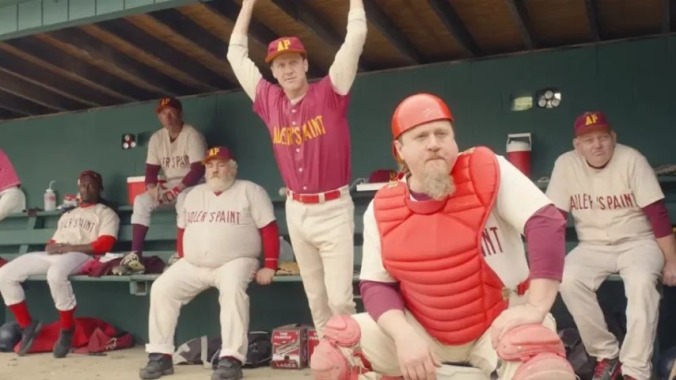
Carson Lund’s feature directorial debut starts and ends on a baseball field, and within the world of the film, that field won’t be there for much longer after the camera fades to black, either. Eephus is an elegy for the last small-town game that will ever be played on Soldier’s Field, the demolition of which is to make way for a new public school. It’s difficult to complain about the construction of an institution that will benefit the local children, but the men who comprise the teams of the Riverdogs and the Adler’s Paint still grumble and mutter to themselves, angry about the “art classes” that will be held on top of what was once a spot to uphold a great American tradition. The film is placed sometime in the 1990s, when people still drove IROC-Z’s, still listened to chintzy local ads on the public radio, and didn’t have quite as many distractions to hinder interest in getting a group of mismatched guys together to play a good old game of baseball.
Eephus—which was co-written by Lund alongside Michael Basta and Nate Fisher, the latter of whom plays the character of Merritt in the film—is named after a type of flashy trick pitch that wouldn’t normally be seen in professional baseball. As Merritt wistfully explains to one of his teammates while benched, an Eephus pitch “stays in the air forever.” It’s slow with a high arc, meant to confuse the hitter and catch him off guard. Of course, Eephus isn’t a film about professional baseball. It’s a film about mostly middle-aged men past their prime, and younger men who show some potential, all of whom have gotten together to play a game that isn’t very good and becomes an overt symbol for hanging onto the past. The “Eephus” pitch is an apt characterization for the film that now shares its name, an odd, surprising story about a baseball game with seemingly little to no stakes, that continues on for long after it should’ve already ended. The two teams aren’t playing to do something silly like save the field, because the construction of the school has already been decided. The stakes are much more personal; when the game ends, something else crucial ends for each of the men as well. —Brianna Zigler
10. Major League (1989)
Director: David S. Ward

Many can laugh at this crazy cast of oddballs, but for those in Cleveland and northeastern Ohio, it’s all too real. Not until the second film’s release did the Cleveland Indians finally break out of their 30-year slump. Some will say it was the new stadium. Others, the even more superstitious ones (most baseball fans), may point to the dominance and swagger of Rick “Wild Thing” Vaughn, as portrayed by Charlie Sheen. (Fun fact: Sheen was actually a star pitcher in high school.) Whatever the case, the really bad times are in the past, and let’s hope, for the sake of another one of these movies popping up, they stay there.—Joe Shearer
9. No No: A Dockumentary (2014)
Director: Jeffrey Radice

If you’ve ever heard of Dock Ellis, then you know the story: in 1970, pitching professional ball for the Pittsburgh Pirates, he threw a no hitter (a “no no”) while high on LSD. It’s a great story, especially told from Dock’s point of view—replete with crucial tidbits about how the catcher wore tape on his fingers so that the tripping Dock could see the signals, or how the level of Dock’s intoxication wasn’t exactly a rarity—but that story is only one page in the much broader account of Dock Ellis’s iconic tenure on this earth. A true-blue weirdo with an admirable proclivity to give practically zero fucks (not to mention becoming, in retrospect, an unheralded civil rights firebrand), Dock was a man of both radical shallowness and progressive steadfastness—one of addiction, salvation, dedication and devotion. And the story went: In 1970, pitching professional ball for the Pittsburgh Pirates, Dock Ellis threw a no hitter while high on LSD—it was a sad reminder of how far out of control his life had swerved.—Dom Sinacola
8. The Bad News Bears (1976)
Director: Michael Ritchie

Vulgar, politically incorrect and heartfelt to the extreme, this baseball flick about a youth baseball team of misfits is a metaphor for that shocking reality check we all had as kids. Maybe all grown ups aren’t role models. But through all the winning and losing—mostly losing in the beginning—both the bad-example, beer-guzzling coach (Walter Matthau) and his bad-news Bears find redemption through each other. Is it a “kids” movie? No, it’s an everyone movie.—Joe Shearer
7. Sugar (2009)
Directors: Anna Boden, Ryan Fleck

Sugar, the second film by writer-director duo Anna Boden and Ryan Fleck, follows promising baseball pitcher Miguel (Algenis Perez Soto)—nicknamed Sugar—from his home in the Dominican Republic through a series of minor league teams in the U.S. This isn’t The Natural, but simply naturalistic, a non-judgmental glimpse into the rigors of professional baseball, where young outsiders chase the American dream in its most iconic form, facing culture shock and loneliness in the process. Yet, Sugar is, more than anything else, a character study of a particular young man, not an indictment of a system, and as you might expect from the writers and directors of Half Nelson, the film spends far more time studying the intricate details of Miguel’s life than it does designing a dramatic arc. Sugar, though, is a subtler film than Half Nelson, in many ways resembling the 1966 first feature by Ousmane Sembène, Black Girl, about a young woman who moves from Senegal to the south of France and feels domesticated by a white upper class. Fittingly, the political barbs are softer in Sugar, as I suspect they are in Miguel’s own thoughts. Miguel is an innocent who barely speaks English, wholly unprepared for the nest of confusion that he’s about to foment in his heart. Whether you find the film’s conclusion a frustrating side step or a personal triumph depends on whether you’ve taken the film’s many opportunities to understand that heart. I found it sublime.—Robert Davis
6. Ken Burns: Baseball (1994)
Director: Ken Burns

Ken Burns’ collection of documentaries have captured everything that makes America unique from jazz to our nation parks to the Civil War. So of course he’s devoted his singular talents and robust research department to sum up the history of baseball during the 20th century in just 22 hours (not including his follow-up The Tenth Inning). It’s a TV miniseries more than a movie, but we’re including it here anyway. Divided into nine innings, the project spends ample time on all the sport’s biggest personalities from Ty Cobb and Babe Ruth to Jackie Robinson and Roger Maris. But it’s as much about the changes to our nation as it is to what’s happening on the field, just like everything the Great American Chronicler approaches.—Josh Jackson
5. The Sandlot (1993)
Director: David Mickey Evans

No other film in the history of cinema captures childhood summer nostalgia like this classic about a group of boys in the early ’60s who play baseball (nearly) every day at a local sandlot. When they aren’t playing, the thing they “tolerated best” is going to the pool, where on one day, the geeky Squints plays out every boy’s dream and lays a big one on the lifeguard, Wendy Peffercorn. Ah, one of the best and most appropriate uses of the Drifters’ “This Magic Moment.” And then, there’s “the pickle”—where Smalls naively borrows and loses his step dad’s Babe Ruth autographed ball, never hearing of the “lady” who signed it. Who says childhood is simple?—Joe Shearer
4. Bull Durham (1988)
Director: Ron Shelton

I believe in ridiculous names like Crash Davis and Nuke LaLoosh. I believe in romantic comedies about giving up on a certain phase of your life where characters stand up and deliver cliched “I believe” speeches that, despite being borderline cheesy, somehow ring completely true. And yes, I too believe there should be a Constitutional Amendment banning Astroturf and the designated hitter. I believe in Bull Durham. The most engaging presentation of the minor-league life on film—and a pretty salute to baseball, in general—this first installment in the unofficial Kevin Costner Baseball Trilogy proved that baseball could equal big box office. Costner and Susan Sarandon anchor this film that does its part to engender a love for the game and the people who court it.—Bonnie Stiernberg & Michael Burgin
3. The Pride of the Yankees (1942)
Directors: Sam Wood

Gary Cooper stars as the legendary Lou Gehrig, whose stunning career was ultimately cut short by the nerve disease that would carry his name. But it’s impossible to view this film and this man’s life without feeling a bit optimistic, especially when Cooper recreates Gehrig’s humble farewell speech. When he utters that famous, powerful line to a packed Yankee Stadium, “Today, I consider myself the luckiest man on the face of the earth,” you can’t help but be overwhelmed by goosebumps. It’s one of the saddest happy endings ever.—Joe Shearer
2. Field of Dreams (1989)
Director: Phil Alden Robinson

There’s a little fantasy in most sports dramas, overcoming impossible obstacles and peaking at the magical moment to carry the day. But Field of Dreams, adapted from W.P. Kinsella’s novel Shoeless Joe, isn’t a story of athletic prowess or winning the day. It’s a story of believing in the magic of sports. It’s a story of fathers and sons, of the hard work of play, of disconnecting from the worries of the real world to play a game of catch. In other words, it’s about baseball, the only sport that can turn an Iowa cornfield into a little slice of heaven. Of course Kevin Costner and James Earl Jones’ buddy journey to belief is sentimental; America’s pastime is nothing without sentiment. The major leagues may wish that all it took was new state-of-the-art taxpayer-subsidized sports complexes outside of their traditional downtown locales to spike attendance, but in 1989 we all believed. “If you build it, they will come…”—Josh Jackson
1. The Natural (1984)
Director: Barry Levinson

Not just the greatest baseball movie of all time, but possibly one of the greatest sports films of all time. Roy Hobbs (Robert Redford) is a promising, young prospect with a bright career ahead of him in the 1930s when a troubled femme fatale guns him down at age 19. Sixteen years after the fact, he isn’t ready to let go of his love of the game, getting signed to a fictional scrub team called the New York Knights. It’s more than a story about baseball; it’s about a middle-aged man living his dream despite the naysayers. It’s a tale about a guy distracted by the glitzy glamorous babes all famous people gravitate towards, only to discover a happier life with his high-school sweetheart (Glenn Close). But when Hobbs hits the big two home runs—the one that breaks the clock, and the showstopper at the end that kills the lights, literally—and Randy Newman’s beautiful score triumphantly takes over, you know this is the ultimate take on the summer classic.—Joe Shearer























